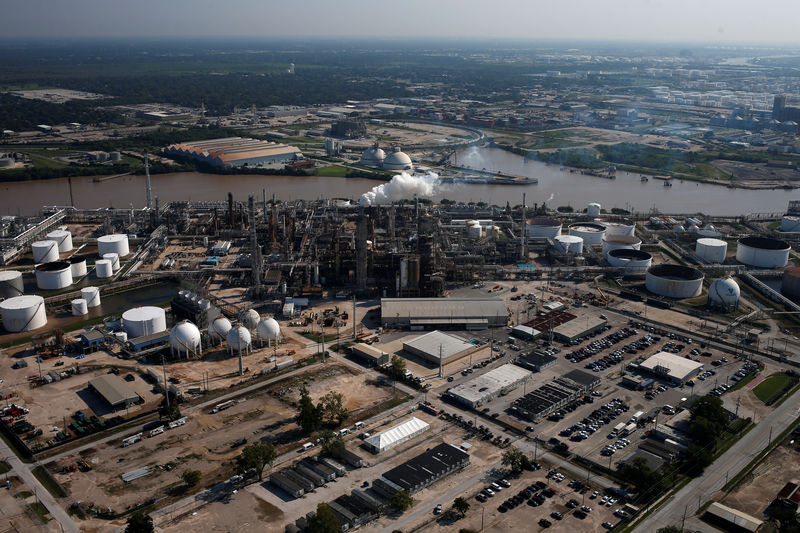By Stephanie Kelly and Jarrett Renshaw
NEW YORK (Reuters) - U.S. independent refiners are expected to roll out lower than expected first-quarter profits after a spate of outages, weak gasoline margins and a surge in the price of Canadian oil, according to analysts.
Major independent refiners cut production dramatically during the quarter, with some electing to undergo maintenance rather than produce barrels at a time when gasoline margins slumped.
Several major U.S. refiners, including Valero Energy Corp (NYSE:VLO), HollyFrontier Corp, and Marathon Petroleum Corp (NYSE:MPC), are all expected to fall short of consensus estimates when they report results, according to Refinitiv Eikon's SmartEstimate model, which values more recent revisions from higher-ranked analysts.
However, reduced refining output in the early part of the year sets up the industry for a potential rebound as the critical summer months approach. With gasoline stockpiles at a four-year low on a seasonal basis, margins have rebounded in anticipation of driving season.
U.S. refinery utilization dropped to 87.5 percent in early April, the lowest seasonally since 2014. Refiners had been running full-tilt for much of 2018, encouraged by strong demand for distillates. But in the process, they overproduced gasoline, tanking margins for the fuel along the way.
Those margins fell to $3.64 a gallon in January, the lowest since 2009. They have since recovered, and were at about $23.00 a gallon on Monday, as inventories have fallen to about 228 million barrels from almost 260 million barrels in mid-January.
(GRAPHIC: Gasoline stocks fall as refinery runs drop https://tmsnrt.rs/2Iafyjp.)
Refiner earnings kick off this week with Valero on Friday. Since the beginning of April, analysts, on average, have revised projections for refiners lower by more than 5 percent, according to Refinitiv data.
Analysts have sharply lowered estimates for Valero, Marathon and HollyFrontier, along with PBF Energy and Phillips 66 (NYSE:PSX), in the past month, putting them in the bottom quartile among U.S. companies in terms of revisions, according to Refinitiv data.
On top of heavy maintenance, fires broke out at facilities over the last few months, including at Valero's Port Arthur, Texas, refinery, Exxon Mobil (NYSE:XOM) Corp's Baytown, Texas, refinery and HollyFrontier's El Dorado, Kansas, refinery.
HollyFrontier lowered the amount of crude it expected to process in the first quarter by 5,000 bpd. Analysts at Goldman Sachs (NYSE:GS) downgraded the company's outlook last week on concerns that profits would take a hit after Canadian crude differentials collapsed.
Sandy Fielden, director of commodities and energy research at Morningstar, said PBF also lost out because of "the Canadian crude discount just disappearing."
Canadian crude oil had been heavily discounted due to oversupply and lack of pipelines, but that discount eroded after the province of Alberta instituted production cuts. Western Canada Select (WCS) recently has traded around $9.25 a barrel under U.S. crude, compared with $15.65 at the beginning of the quarter. [CRU/CA]
BUMPER BUNKER PROFITS?
Some refiners decided to undergo heavier planned maintenance during the quarter to ready facilities for new low-sulfur marine fuel requirements. The new regulations required by the International Maritime Organization (IMO) are due to come into effect on Jan. 1, 2020 and could produce bumper profits.
The rules outlaw high-sulfur fuels traditionally used for shipping - a boon for complex refineries that can break down products used by marine vessels into lower-sulfur products with higher margins.

Refiners could now run their plants at higher rates to take advantage of the higher margins, and analysts expect gasoline inventories to climb through the remainder of the year as a result.